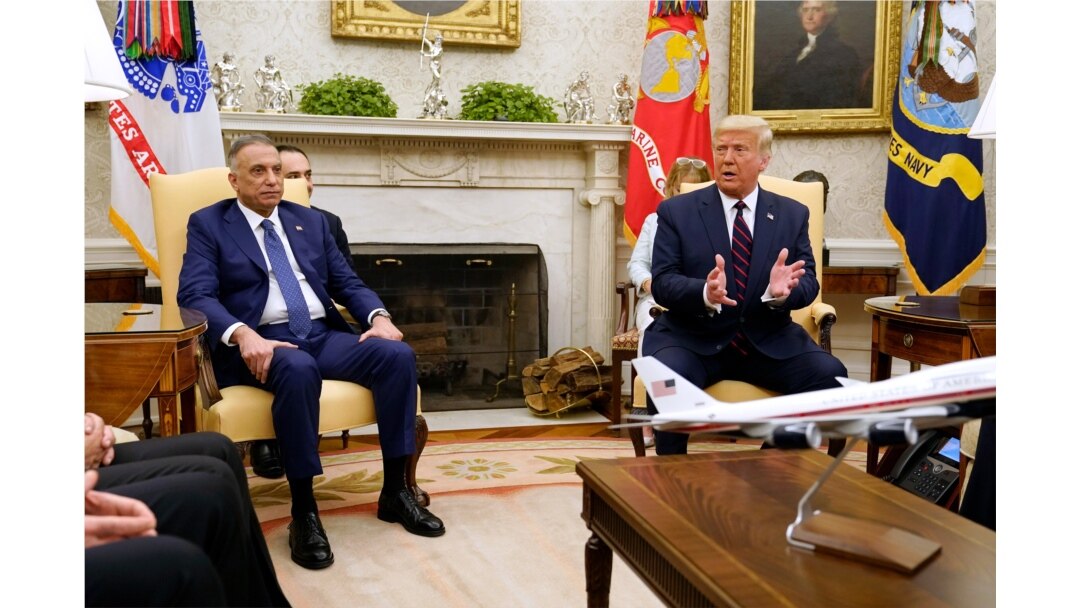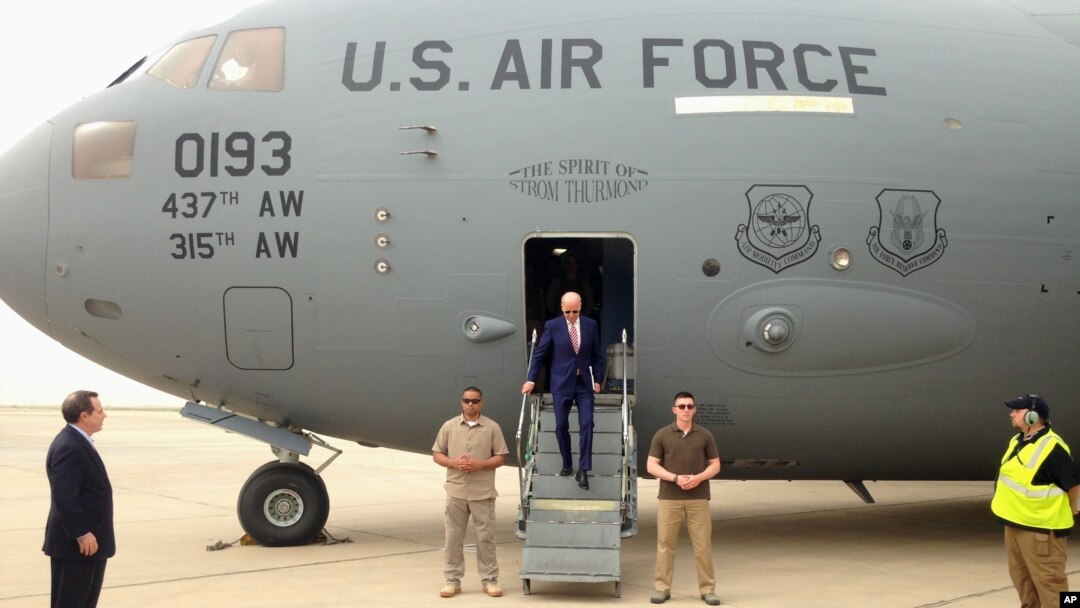The projected election of Joe Biden as the 46th president of the United States has been met with mixed reactions in war-torn Iraq, where nearly 3,000 American troops remain to help the country's forces fight the remnants of the Islamic State terror group.
While Iraqi leaders from across the political spectrum have welcomed Biden's victory, some Iraqis fear the return of the Democrats to power may translate into greater influence for Iran and its violent proxy groups in the oil-rich country.
"Some welcome the end of the disruptive and unpredictable policies and tactics of the past four years," Bilal Wahab, an Iraq expert at the Washington Institute for Near East Policy, told VOA. "Others fear that Biden would ease the pressures on Iran and its proxies in Iraq to the detriment of gains made by last year's protest movement."
Anti-IS operations
Following a visit to Washington by Iraqi Prime Minister Mustafa al-Kadhimi, the Trump administration in September lowered the number of U.S. troops in the country from 5,000 to 3,000.

FILE - President Donald Trump meets with Iraqi Prime Minister Mustafa Kadhimi in the Oval Office of the White House, Aug. 20, 2020.
The Pentagon says the job of the remaining American military personnel is not to engage in combat operations but to train and advise Iraqi forces to destroy IS sleeper cells, a policy that is expected to continue under the Biden administration.
"In the war against ISIS, the U.S. has found a new formula to fight terrorism that does not involve U.S. boots on the ground. I expect the alliances with local partners in this fight to continue," Wahab said, using another acronym for Islamic State.
Pro-Iran militias
Under the current circumstances, observers say, the incoming administration is unlikely to increase U.S. troop levels in the country, where opposition to foreign troops appears to have increased following recent military moves by the Trump administration.
In addition to being accused of involvement in bloody crackdowns on Iraq's peaceful anti-government protesters, pro-Iran militia groups, including most notably the Kataib Hezbollah (KH), have been viewed as the primary suspect in attacks on U.S. bases in the country resulting in the death of at least one American.
In January, the U.S. responded forcefully by killing Iran's powerful military general, Qassem Soleimani, in a drone strike near the Baghdad airport. KH leader Abu Mahdi al-Muhandis also was killed in the attack. Subsequently, the Iraqi parliament passed a nonbinding resolution to expel all U.S. troops from the country.
FILE - Iraqi women gather at the scene where Iran's Quds Force top commander Qassem Soleimani and Iraqi militia commander Abu Mahdi al-Muhandis were killed in a U.S. airstrike at Baghdad airport, Iraq, Feb. 13, 2020.
"Trump's era was a very negative one, a period of demolition," said KH spokesman Mohammad Mohyi in a recent interview with Agence France-Presse. "We hope the new administration will resolve this, by ending the crisis and withdrawing its troops."
The militiaman's hopefulness is largely caused by the belief the U.S. will rejoin the 2015 Iran nuclear deal, which could, in turn, mean less confrontation with the Islamic Republic and its proxies throughout the wider Middle East, according to experts. In May 2018, the Trump administration withdrew from the deal.
"This optimism voiced by the militia groups that are linked and loyal to Iran comes from Iran's optimism in the first place," Hussein Ali Allawi, a professor of national security at Nahrain University in Baghdad, told VOA by phone.
Following continued rocket attacks on U.S. bases in Iraq, media reports suggested U.S. Secretary of State Mike Pompeo, in a phone call with Iraqi President Barham Salih, had recently threatened to close his country's large embassy in Iraq if the country failed to rein in the militia groups. Subsequently, Iraqi leaders reportedly pressured KH to end its attacks on U.S. interests.
Hours after Biden's projection as the winner Saturday, Iraq's prime minister went on Twitter to send his congratulations.
"I look forward to working with you on strengthening the strategic ties that bind Iraq and the United States, building on common values between our nations to overcome challenges together," Kadhimi posted.
The Kurds and the mountains
Biden's victory is particularly welcomed by Iraqi Kurds, who see him as a longtime friend of their people who suffered a genocide under Saddam Hussein. A 2002 video of then-Senator Biden addressing the autonomous Kurdistan Region's parliament has resurfaced on social media.
"The mountains are not your only friends," Biden reassures the Kurds in the video.
Prominent Kurdish leader Masoud Barzani, who served as the region's president until 2017, called Biden a friend.
"I express my heartfelt congratulations to you, my friend, President-elect @JoeBiden, for your victory," Barzani tweeted.
What made Biden more popular among Kurds was his 2006 proposal to divide Iraq into three autonomous regions for the country's main components, namely, the Kurds, the Sunnis and the Shiites. The Kurds, however, appeared to be the only group to welcome his controversial plan.
FILE - U.S. Senator and Democratic presidential candidate Joe Biden, right, talks with soldiers as he travels in a military vehicle to Iraq from Kuwait in this Sept. 6, 2007, handout photo.
Biden later explained his proposal had been misinterpreted as it had never called for the partition of the country into three independent states but saw decentralization of power in the multiethnic country as the answer to instability.
One of Iraq's prominent Sunni leaders, who vehemently opposed Biden's plan when it was announced, was Misha'an al-Juburi. In a tweet welcoming Biden's election, Juburi announced that he has now changed his mind about the notion.
"We congratulate the American people for their choice, and President[-elect] Biden on his victory and all those who are happy with this victory, ourselves included," al-Juburi said.
He added that after the destruction by Iran-backed militias in his country, "we now look forward to implementing his plan on Iraq, which we opposed previously."
Even though Wahab, the Iraq scholar, does not expect Iraq to be a centerpiece of Biden's foreign policy, he says the incoming administration's approach might be a reason for celebration by pro-democracy forces in the country.
"The change might be in Biden's approach to Iraq, who promised to reinject values into U.S. foreign policy and lead with diplomacy. For the youth movement that wants to make inroads in Iraq's next elections, this might be good news," he added.


